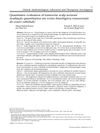An Immune Regulatory CCT Repeat Containing Oligodeoxynucleotide Capable of Causing Hair Loss in Male Mice
January 2016
in “
Human & Experimental Toxicology
”

TLDR A specific DNA sequence caused hair loss in male mice by activating immune cells and increasing a certain immune signal.
In a 2016 study, researchers found that an oligodeoxynucleotide with CCT repeats (CCT ODN) caused hair loss in male F1 and Balb/c mice, but not in female mice or either gender of C57BL/6 mice, indicating a sex and genetic specificity in the response to this compound. The hair loss was associated with increased infiltration of NKG2D+ cells in the skin and elevated interferon-gamma (IFN-γ) mRNA expression in cultured splenocytes. The CCT ODN did not induce expression of NKG2D ligands in hair follicles, and no differences were found in the androgen receptor gene or blood testosterone levels between affected and unaffected mice. The study suggests that CCT ODN may cause hair loss by mobilizing NKG2D+ cells to hair follicles and inducing IFN-γ production, leading to catagen-like changes in hair follicles. The exact number of mice used in the study was not specified in the summary. The research highlights the potential for immune-regulatory oligonucleotides to cause unexpected clinical outcomes such as hair loss and underscores the need for further investigation into the molecular mechanisms involved.










